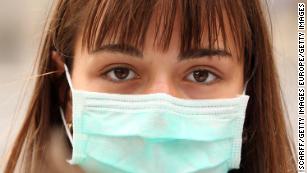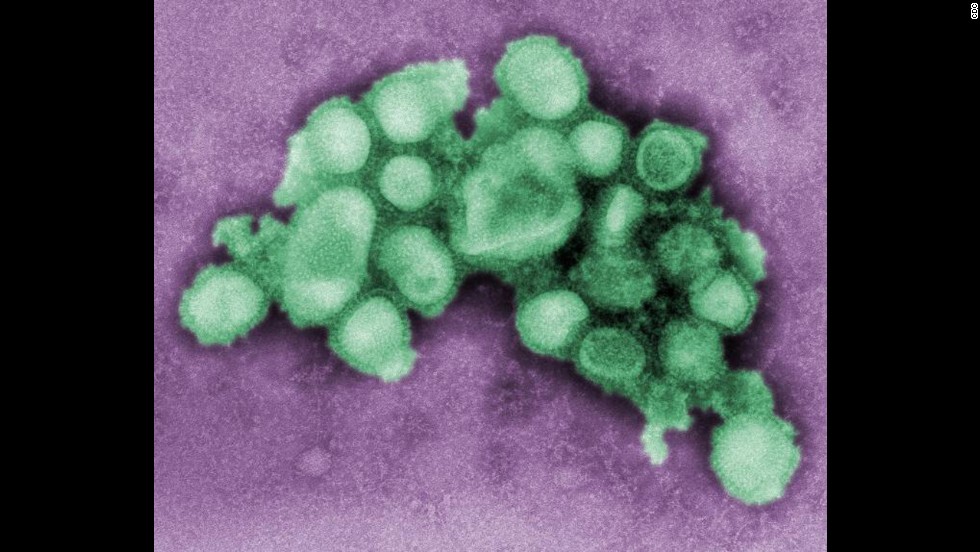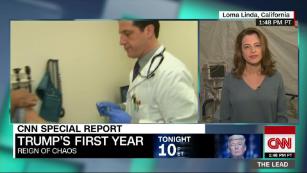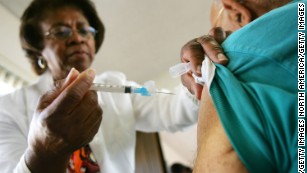Schools in Gulf County, Florida closed Friday due to "a significant impact from influenza-like cases" among students and staff, according to an announcement from the superintendent of Gulf County Schools,
on the school district's Facebook page.
Schools in Gunter, Texas closed "due to widespread flu and illness" for an entire week and
reopened on Wednesday, according to an announcement from
the Gunter Independent School District's superintendent. The school district closed after 253 student absences, with the majority being due to either confirmed flu or flu-like symptoms.
While there's not one state in particular seeing the worst or higher flu activity than others, "we are seeing some signs that flu is on the decline in the West," CDC's Nordlund said.
During the call with reporters, Jernigan said, "we have several more weeks of flu to go, however, we have some signs that flu activity may have peaked in some parts of the country. California and other states on the West Coast are seeing activity begin to go down."
'We tend to forget very rapidly the impact that influenza has'
Dr. Randy Bergen, clinical lead of the Kaiser Permanente Northern California Flu Vaccine Program, has been tracking laboratory surveillance and outpatient data for flu cases this season.
In a normal peak week of the flu season, Bergen said that Kaiser Northern California typically orders about 2,000 to 3,000 respiratory viral tests.
At week 52 of this flu season, which was the last week of 2017, however, "we did over 5,000 respiratory viral tests," he said. "So, I think those are kind of the most compelling numbers that perhaps I can give you for how severe this flu season is."
The current pervasiveness of the flu across the country appears to be similar to what was seen during peak
flu season from 2014 to 2015, said Dr. Pedro Piedra, professor of molecular virology and microbiology and pediatrics at Baylor College of Medicine in Houston.
That year
the
H3N2 subtype of the influenza A virus was the
dominant strain making people sick, which appears to be
the same strain being seen this year. It is typically associated with higher rates of hospitalizations and deaths, as was the case in 2014 to 2015.
"We tend to forget very rapidly the impact that influenza has on our communities, and we often times have flu seasons just as intense as this one, but we forget it," Piedra said.
"Every so often -- it's really like every other year to every third year -- where we have a flu season that is intense," he said. "We are reminded about the number of deaths that we see, about the number of hospitalizations, the number of outpatient visits, but this happens."
At this point, Jernigan said that no one knows how the flu season will end, but it's currently tracking at the same level as 2014-15 season, "which was the last high severity season" the country has seen.
"These numbers can change. We may go above the 2014-15 season, and so I think it's a little hard to make some of those comparisons," he said. "From an activity standpoint, we're seeing the most influenza-like illness activity since 2009, and for hospitalizations we're seeing about the same rates that we saw in 2014-15."
Things to do to avoid the flu
To help prevent getting the flu this season, there is still time to get a flu shot, Whitley-Williams said.
"Even if you get the flu, having received the flu vaccine may help you in terms of not having as serious a course or as devastating a course," she said. "It may prevent you from being hospitalized if you have received a vaccine, so there is still that benefit in some cases."
She added that if you are experiencing flu-like symptoms, and think that you may have the flu, it might be time to call your doctor -- especially if you have a persistent fever, weakness, or body aches that won't go away even with over-the-counter medications.
Regardless, "if you're pregnant, you definitely want to go in and see the doctor. If you're over 65, you definitely want to go in and see the doctor, and if you are under 5 years of age," she said. "These are the groups that are at highest risk."
In addition, the good old advice to wash your hands still holds true as well as keeping your germs to yourself.
 भाई रणवीर सिंह जी ने भारतीय नस्ल की गाय के संरक्षण के लिए ट्रेकटर के उपयोग को और बढ़ावा न देकर बैलों की जोड़ी द्वारा हल चलाने की परम्परा की ओर लौटने की बात की है। उनकी इस बात में जान है के आज भी भारत के अंदरूनी इलाकों में खेत जोतने का यह तरीका काम कर रहा है। मैं इससे सहमत हूँ दिल्ली से गोहाटी तक की रेलयात्रा में ही नहीं दिल्ली से केरल प्रदेश की यात्रा में भी ,दिल्ली चैन्नई ,दिल्ली मुंबई की यात्राओं में भी मैंने यही नज़ारा देखा है।चैन्नई से बंगलुरु और चैन्नई से पुडुचेरी यात्रा में यही देखा है। चैन्नई से तिरुपति यात्रा में भी।केरल के कन्नूर से ऊटी और उससे और आगे भी दृश्य यही है।
भाई रणवीर सिंह जी ने भारतीय नस्ल की गाय के संरक्षण के लिए ट्रेकटर के उपयोग को और बढ़ावा न देकर बैलों की जोड़ी द्वारा हल चलाने की परम्परा की ओर लौटने की बात की है। उनकी इस बात में जान है के आज भी भारत के अंदरूनी इलाकों में खेत जोतने का यह तरीका काम कर रहा है। मैं इससे सहमत हूँ दिल्ली से गोहाटी तक की रेलयात्रा में ही नहीं दिल्ली से केरल प्रदेश की यात्रा में भी ,दिल्ली चैन्नई ,दिल्ली मुंबई की यात्राओं में भी मैंने यही नज़ारा देखा है।चैन्नई से बंगलुरु और चैन्नई से पुडुचेरी यात्रा में यही देखा है। चैन्नई से तिरुपति यात्रा में भी।केरल के कन्नूर से ऊटी और उससे और आगे भी दृश्य यही है। 





















